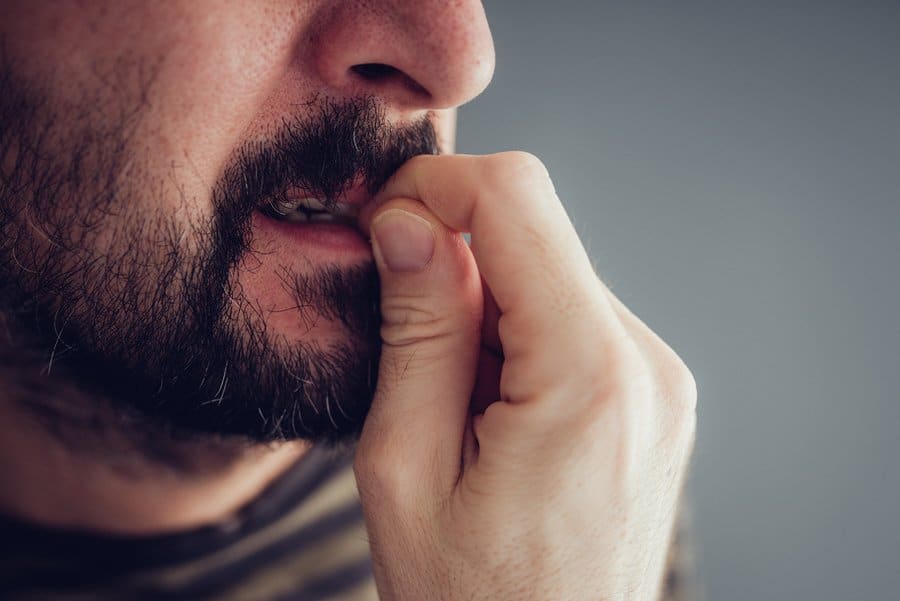How stress affects Dental Health
In today's fast-paced life, the world is overrun by stress. Stress itself isn't bad. In small doses, it can help you perform under pressure and motivate you to do better. But having an extreme amount of stress for a chronic period of time will result in many negative outcomes, including effects on the
oral health.
Stress is your body's way of handling danger. When you feel threatened, your nervous system responds by releasing a flood of stress hormones, and including adrenaline and cortisol, which prepares the body for emergency action. The
heart pounds faster, blood pressure rises, muscles tighten, breath quickens, and the senses become sharper. These physical changes increase the strength, stamina, reaction time, and enhance focus; preparing the body to either fight or flee from the danger at hand.
Stress can eventually start to have an effect on both your health and your oral health.
8 Stress-related oral health concerns
Stress may cause the following oral health concerns
1. Teeth grinding (bruxism) and/or temperomandibular joint
stress can cause constant thinking and worrying, which can affect your body when it's asleep and cause you to grind your teeth. If you are stressed before you go to sleep or you wake up with headaches, you may be grinding your teeth at night. Stress levels are the strongest predictor of teeth grinding, implicated in 70% of cases. Not dealing with daily stressors head on, increases the likelihood of
tooth damage and facial pain. Night guards are prescribed to relieve the teeth from night grinding habits.
2. Mouth sores (aphthous ulcer) examples include canker sores or cold sores
One of the main causes of mouth sores is emotional stress. Canker sores heal on their own without any treatment; however, dentists may recommend pain relievers such as ibuprofen and acetaminophen if the sores cause significant pain.
3. Constant clenching of the teeth
Stress can cause you to clench your teeth during a thought or action without you realizing it, which can have an effect on your teeth.
If you're feeling stressed and have too much to do, you may find yourself not having the time to maintain good oral hygiene routing like brushing your teeth or
flossing regularly. A neglected oral health routine, unhealthy lifestyle choices and conditions such as dry mouth increase your risk of tooth decay and gum problems.
5. Poor diet/nutrition
Having a poor diet as a result of stress can cause a lack in vitamin and minerals that you need to be healthy. Proper diet & nutrition, especially vitamin D, is essential to maintain a healthy gut microbiome balance, which supports a healthy immune system, and bone homeostasis (the process where old bone is replaced by new bone tissue). And ultimately, vitamin D plays a crucial role in all three of these factors and in preventing
gum disease.
Lack of Vitamin K can also lead to
bleeding gums. Vitamin K helps in blood clotting. If you don't get enough from your diet or your body doesn't absorb it well, it can cause bleeding problems.
Lack of Vitamin C leads to scurvy, a condition related to poor nutrition. It can make one weak, anemic, and lead to bleeding under the skin. Bleeding gums are a typical sign of scurvy.
6. Gum disease or worsening of existing gum disease
stress can affect your immune system and can cause damage to your gums. Under stress, the body produces more of cortisol, which acts as an anti-inflammatory agent and when cortisol is produced peripherally in the gums, it stimulates mast cells to produce more proteins, increasing inflammation and the progression of
periodontal disease.
7. Dry mouth
Stress is a major reason to have a dry mouth, especially before a stressful appointment or presentation for example. This causes a lack of saliva in the mouth and saliva has many oral health benefits, including washing away food particles from the teeth and gums. Stress, Fear, depression, and anxiety may also lead to dry mouth. Some people report the sensation of chronic dry mouth, even though their salivary glands are normal.
Feeling anxious or stressed can reduce the flow of saliva in your mouth, but for some people, it isn't the anxiety itself that produces it – it's the antidepressant or related medication they're taking. Dry mouth is a known side effect of antidepressants, antipsychotics, antihistamines, beta-blockers and muscle relaxants, as well as treatment for Parkinson's disease and epilepsy.
8. Missing regular dental appointments
You may find yourself having too much to do to see your dentist regularly. Leaving a tooth to decay is not only painful, but it could also lead to infection, in turn, leading to tooth loss.
Consult your dentist to get advice on how you can minimize stress-related damage to your teeth, gums, and oral health

